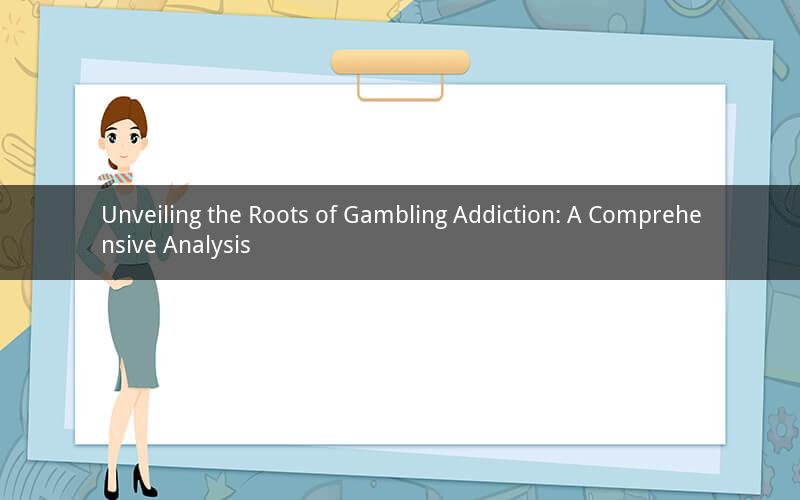
Gambling addiction, often referred to as gambling disorder, is a complex issue that plagues individuals worldwide. It affects people from all walks of life, regardless of age, gender, or socioeconomic status. Understanding the cause of gambling addiction is crucial in addressing and preventing this harmful behavior. This article delves into the various factors that contribute to the development of gambling addiction, providing insights into the psychological, social, and environmental aspects that play a significant role.
1. Psychological Factors
One of the primary reasons for gambling addiction lies in psychological factors. Individuals who are prone to developing gambling addiction often exhibit certain characteristics, such as impulsivity, thrill-seeking, and low self-esteem. These psychological traits make them more susceptible to the allure of gambling.
Impulsivity: Individuals who struggle with impulsivity tend to act without thinking, leading them to make impulsive decisions, including engaging in gambling activities. This impulsive behavior can quickly escalate into a harmful addiction.
Thrill-Seeking: People who have a high need for excitement and stimulation may be more likely to develop gambling addiction. The adrenaline rush and sense of thrill associated with gambling can be highly addictive, making individuals crave more and more of these experiences.
Low Self-Esteem: Individuals with low self-esteem may turn to gambling as a means of boosting their self-worth. The temporary high that gambling can provide may give them a false sense of accomplishment, reinforcing their reliance on this activity.
2. Social Factors
Social factors also play a significant role in the development of gambling addiction. Peer pressure, family dynamics, and cultural influences can contribute to an individual's vulnerability to gambling.
Peer Pressure: Individuals who are surrounded by friends or acquaintances who engage in gambling may feel pressured to join in, as they seek to fit in or be accepted by their social circle.
Family Dynamics: Growing up in a family with a history of gambling or substance abuse can increase an individual's risk of developing gambling addiction. The presence of role models who engage in harmful behaviors can normalize such actions and make them more appealing.
Cultural Influences: In some cultures, gambling is seen as a legitimate form of entertainment or even a way to make money. This cultural acceptance can make individuals more susceptible to the allure of gambling, as they view it as a socially acceptable activity.
3. Environmental Factors
The environment in which an individual lives can also contribute to the development of gambling addiction. The availability of gambling opportunities, exposure to gambling advertisements, and the presence of gambling-related amenities can all influence an individual's likelihood of developing an addiction.
Availability of Gambling Opportunities: The proliferation of casinos, online gambling platforms, and lottery games has made gambling more accessible than ever before. The increased availability of gambling opportunities can make it easier for individuals to engage in this harmful behavior.
Exposure to Gambling Advertisements: The widespread use of gambling advertisements in various media outlets can create a sense of normalcy and desirability around gambling. This exposure can make individuals more likely to engage in gambling activities.
Presence of Gambling-Related Amenities: The presence of amenities such as restaurants, hotels, and entertainment venues in close proximity to casinos can make gambling more appealing and accessible. Individuals may be more inclined to visit these locations, leading to increased exposure to gambling opportunities.
Frequently Asked Questions:
1. What are the psychological factors that contribute to gambling addiction?
Psychological factors such as impulsivity, thrill-seeking, and low self-esteem can contribute to the development of gambling addiction. These traits make individuals more susceptible to the allure of gambling.
2. How do social factors influence the development of gambling addiction?
Social factors such as peer pressure, family dynamics, and cultural influences can contribute to an individual's vulnerability to gambling addiction. These factors can create a conducive environment for the development of harmful gambling behaviors.
3. What role do environmental factors play in the development of gambling addiction?
Environmental factors such as the availability of gambling opportunities, exposure to gambling advertisements, and the presence of gambling-related amenities can influence an individual's likelihood of developing an addiction.
4. Can genetics play a role in gambling addiction?
Yes, genetics can play a role in gambling addiction. Research suggests that there may be a genetic predisposition to developing this addiction, making some individuals more susceptible than others.
5. How can one overcome a gambling addiction?
Overcoming a gambling addiction requires a combination of treatment approaches, including therapy, support groups, and lifestyle changes. Seeking professional help and building a strong support network can significantly improve an individual's chances of overcoming this addiction.